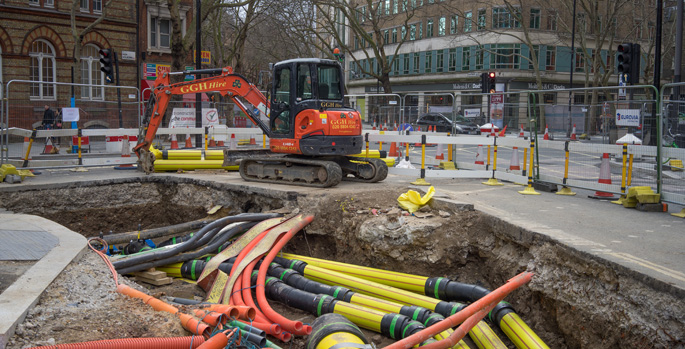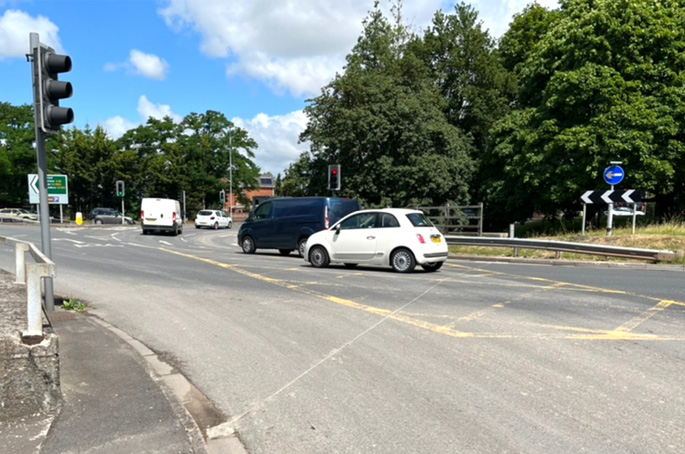MPs have accused the Government of failing 'to stand up to utility companies' after ministers rejected Parliamentary recommendations designed to improve street works standards.
The Transport Committee mave 12 recommendations in its report, Managing the impact of street works - the Government rejected nine of them in its response. The remaining three are set to undergo consultation with industry and road authority partners.
Ministers rejected calls to let local authorities set up lane rental schemes, which charge up to £2,500 per day for works on busy roads at busy times, without needing approval from the secretary of state.
The Government also threw out recommendations for extending the guarantee period for works from two years to five and for an Street Works Commissioner in England.
Transport Committee chair, Ruth Cadbury MP, said: ‘The Government's rejection of all the major recommendations in our report risks making itself simply look unwilling to stand up to utility companies, on behalf of frustrated road users who have to endure unreasonable and often repeated street work delays.
‘It is all well and good for DfT to say it wants to explore ways to replicate best practice on a voluntary basis, but if the incentives are not changed, we carry on without carrots or sticks, then why should the Government expect anything to change?'
She also highlighted the 'contradiction' between supporting devolution in principle and preventing the expansion of lane rental powers in practice.
Clive Bairsto, CEO of Streetworks UK, which represents utility companies said: ‘It is hugely encouraging to industry that Ministers recognise the vital role of street works in rolling out, upgrading and maintaining the UK's infrastructure. It is also vital that we collectively take time to understand and evaluate some of the recent reforms before too hastily introducing new regimes or regulation.
‘It is particularly pleasing that the Government has resisted siren calls for a universal roll-out of lane rental schemes, extended guarantee periods, and new statutory deadlines and fines. These measures risk adding quite unnecessary costs, administration and complexity at a time when the sector is focused on delivering critical infrastructure projects for communities across the country at pace to provide the levers for economic growth.'
Main responses
The transport committee highlighted the responses to the seven main recommendations.
Devolution of lane rental schemes - rejected
The committee encouraged the Department for Transport (DfT) to devolve approval powers for lane rental schemes but the department rejected this recommendation.
DfT officials agreed that the schemes were an 'important tool' and accepted evalusations showed that had been effective in encouraging utilities to take a more ‘strategic approach'.
However, they also argued there was 'a risk that extending lane rental powers universally could lead to an inconsistent and fragmented approach across the country and expanding their use could increase the risk of ‘poorly targeted schemes' being introduced.
The Government has consulted on devolving approval powers for lane rentals to Mayoral Combined Authorities and said it would publish the results 'in due course'.
Extending the reinstatement guarantee period - rejected
As it currently stands, any reinstatement work must be guaranteed for up to two years after completion (three years for excavations). The committee argued for all works to be guaranteed for up to five years, with utilities facing fines for ‘any secondary remedial work' that is required within that period.
However, the Government argued that the performance-based inspections regime that was introduced in 2023 would be sufficient in ensuring that reinstatements ‘comply with standards', as utility companies must pay for any inspection that is undertaken.
Introducing deadlines for fixing defects - to be reviewed
The committee called for companies to be given deadlines to repair faulty reinstatements, with increasing fines if they fail to meet them. The two-cycle inspection cap should also be lifted, the MPs argued, so that there is no limit on the number of inspections which can be carried out.
DfT officials conceded this issue would 'benefit from further review to ensure the current framework remains fit for purpose' and pledged to consult with the Highway Authorities and Utilities Committee (HAUC UK).
Tightening the use of immediate permits - rejected
The Transport Committee highlighted local authority concerns that some utility providers were misusing immediate urgent and immediate emergency work permits for long standing or predictable issues.
However, the government said that, whilst there has been an increase in the use of immediate urgent permits – from 593,719 (28.2%) in 2021/22 to 703,438 (31.8%) in 2023/24 – there was 'no evidence of misuse'. It pledged to keep the issue under scrutiny.
Longer-term planning - rejected with pledge on cross-departmental working
The Committee urged DfT to make it mandatory for utilities and housing developers to share ‘forward planning information' on the Street Manager system with local authorities and developers of new estates.
The Government agreed in principle with early notification but refused to make it mandatory. It pointed to effective voluntary arrangements, such as between Bristol City Council and Wessex Water and said it wants to explore what barriers there may be to following this best practice elsewhere.
It also committed to working with the local government department to explore options for earlier sharing of information with property developers and councils.
The introduction of a Street Works Commissioner - rejected
It was argued that the introduction of a Street Works Commissioner in England, similar to Scotland's Road Works Commissioner, would help ensure the ‘consistent application and interpretation' of legislation and help resolve disputes between authorities and utilities. The Government, however, said that this ‘appears inconsistent' with its current review of existing arms-length bodies, and also added that this position in England would require far more resources than needed for the Scottish equivalent.
Improved accessibility including sharing feedback from the Disabled Persons Transport Advisory Committee (DPTAC) - agreed to consultation
There is an ongoing, and delayed, update to the Safety at Street Works and Road Works Code of Practice, a joint piece of statutory guidance across the UK's devolved governments, with consultants Arup AECOM. In addition, engagement has taken place with groups representing vulnerable road users including DPTAC to ensure that accessibility needs are fully considered in the revised Code.
DfT officials said they 'are preparing to launch a consultation on the proposed changes to the code and will outline the specific changes made to improve accessibility while 'incorporating advice received from DPTAC'.
The full Transport Committee report can be found here, with the Government response available here.
Image credit: Travers Lewis / Shutterstock.com
































